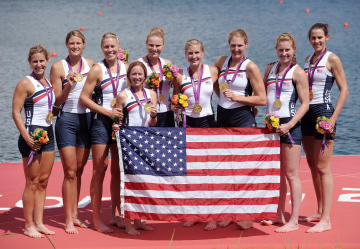U.S. gives another great performance to win gold yet again in women's eights

WINDSOR, England – Sitting on the starting line Thursday, Caryn Davies thought back three years, back to when she was wondering whether she would row for the United States in another Olympics after winning silver in women's eight in Athens in 2004 and gold in Beijing in '08.
She remembered what coxswain Mary Whipple had told her: "I want to feel what it's like to sit on that start line and have that excitement running through me. I want to look you in the eye and know we can have a great race."
Now here was Davies at another Olympics, and it was everything it was supposed to be. She was outside London on Lake Dorney at the Eton College Rowing Centre, one of the finest venues in the sport. The stands were filled with thousands of real fans, not just people gawking at a big event. The Americans were heavy favorites.
Gold lay only two kilometers away.
"There's just no feeling like that," Davies said, "having all that adrenaline running through you, knowing you can have a great performance if you do what you know how to do."
What the Americans know how to do is dominate, and they gave another great performance to win gold yet again. They are undefeated in world championship and Olympic competition since 2006.
[ Related: Team GB takes first gold in rowing ]
The Canadians had been catching up steadily: Three seconds behind at the 2010 world championships in Lake Karapiro, New Zealand; 0.74 seconds behind at the 2011 worlds in Bled, Slovenia; only 0.03 seconds behind in May at the World Cup in Lucerne, Switzerland – a blink of an eye, even though the Americans posted a world-best time of 5:54.17. The Canadians actually posted a faster time in the heats here, too. Theirs was 6:13.91, the Americans' 6:14.68.
When the big race came, the Canadians didn't want to catch up anymore. They wanted to take the lead and try to hold it. The game plan, said Canada coxswain Lesley Thompson-Willie, a five-time Olympic medalist, "was to get out fast in the first 500."
But the Americans roared off the starting line and left Canada to race the Netherlands for silver. At 500 meters, they led the Dutch by 1.5 seconds. At 1,000 meters, they led the Canadians by 2.3 seconds – or three-quarters of a boat length.
At 1,500 meters, there was almost no change. By that point, the boats had reached the half of the lake flanked by the stands, and they could hear the noise and feel the finish. Imagine the adrenaline then.
The Canadians made a late push, but it was too late. The United States came in at 6:10.59, the Canadians at 6:12.06, the Dutch at 6:13.12.
[ Related: What causes rowers to go deaf in races? ]
You would think the Canadians would have been devastated, having worked so hard to close the gap, only to watch it widen again in the Olympics. But they were delighted, linking arms and smiling as they did a post-race TV interview, while the Americans hugged and wept on the dock behind them.
Which says something about their respect for the U.S. program.
"We have to applaud that they are a great crew," said Canada's Natalie Mastracci. "The same things make every Olympic crew great. They have strength, they have endurance, and they have heart."
"They've got a lot of rowers," Thompson-Willie said. "They've got a big sport system, the NCAA. They've got a lot of people coming up. We don't have, perhaps, the same number of athletes, although it's interesting. The U.S., it's often the same athletes coming back."
Among the nine women in the U.S. boat – the coxswain and the eight rowers – Davies and Whipple became three-time medalists. Four others became back-to-back gold medalists: Erin Cafaro, Zsuzsanna Francia, Eleanor Logan, and Caroline Lind. Three more became first-time medalists: Esther Lofgren, Taylor Ritzel, and Meghan Musnicki.
The generations melded into a tight group. Ritzel, the youngest member of the crew at age 23, lost her mother in 2010. She said her teammates got her through it. "They have made what seemed to be an impossible thing to get through possible," she said. Grab an oar. Everyone will pull together.
"We have to do it together, and we have to back each other up," said Whipple, the coxswain with the little voice and the big influence. "It's kind of crazy when you talk about how it's just one 2K, one race. But then on the other side of it, it's the Olympics, and there's a lot of noise, a lot of outside distraction, and I'm really proud of how we handled all that distraction, all that pressure, all that kind of white noise.
"We just wanted to be up there, look each other in the eye, just accept where we are and just enjoy it, just be in that moment. That's what we did. We were in that moment together, one stroke at a time. We backed each other up."
More Olympics coverage on Yahoo! Sports:
More London Olympics coverage on Yahoo! Sports:
• Video: France's president smack talks the Brits over Olympics
• Taekwondo fighter used brothel to fund Olympics training
• Jarring secret kept from Chinese Olympian
